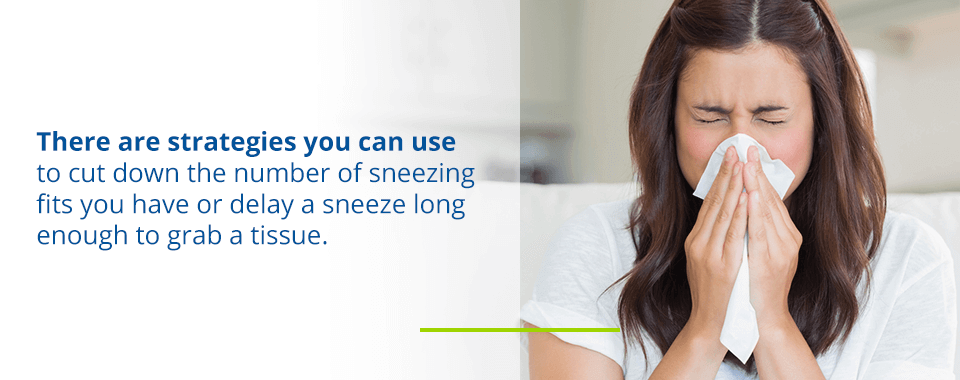
Everything seems to stop when you need to sneeze. The entire body pauses as the tingling in your nose grows. Eventually the tingle forces you to try to expel whatever it is that irritates the inside of your nose. And you sneeze. But it doesn’t appear to have worked because you sneeze again, and again and again.
When you can’t stop sneezing, it’s impossible to do anything else other than sneeze for the duration of the fit. The assumption that you just have a lingering cold or flu is likely incorrect in this situation, especially if you suffer from epic sneezing fits during allergy seasons.
Table of Contents
- The Anatomy of a Sneeze
- What’s the Cause of Uncontrollable Sneezing?
- How to Prevent Sneezing
- What to Do If You Experience Uncontrollable Sneezing
- Still Affected by Allergies? Get Help From a Sinus Doctor
The Anatomy of a Sneeze
Sneezing is an automatic reflex that’s built into every human’s physiology. This reflex occurs when the nose becomes irritated and your body attempts to remove the blockage — beginning with the rapid compression of the chest and diaphragm, which forces air to rush out of your mouth and nose.
This rush of air is meant to force any blockages out of the nasal canal, allowing you to breathe fully while expelling the potentially harmful nose invader. If your body feels like it didn’t get rid of the issue blocking the nasal passage, you will end up sneezing multiple times until your nose is clear or your brain no longer registers the blockage as an issue.
Sneezing a few times to get rid of a blockage is entirely normal. But if you find yourself sneezing for minutes at a time, you might be suffering from problems that your body can’t fix through reflex.
What’s the Cause of Uncontrollable Sneezing?
While everybody sneezes from time to time, it is not as common to sneeze uncontrollably for no apparent reason. If you find yourself sneezing on a regular basis, it is most likely not a cold, the flu or another type of respiratory illness that is causing sneezing fits.
Sneezing is a result of irritation to the mucous membranes located in the nose or throat. The source of the irritation can vary depending on health and environmental factors. Although this irritation can be bothersome, it rarely indicates a serious health problem. The next time you can’t stop sneezing, consider these possible causes of your uncontrollable sneezing:
1. A Nasal Polyp
Your uncontrollable sneezing could be due to a nasal polyp. A nasal polyp is a sac-like growth along the sinus lining that can cause sneezing, a runny nose, stuffiness and a muted sense of smell or taste. If you think you might have a nasal polyp, talk with your doctor for treatment options to reduce your sneezing and make breathing easier.
2. Seasonal Allergies
The most likely culprit of your uncontrollable sneezing fits is a seasonal allergy — like hay fever, the common name for a pollen allergy. Plants and flowers produce more pollen during certain seasons, which can make it more difficult for the nose to regulate and filter the excess particulate matter you inhale. As a result, these fine particles get lodged in the membranes of the nose.
In response, your body will continually sneeze to try to get rid of the matter accumulated in the nose. However, all this sneezing is merely a reflex and won’t actually help solve the pollen problem.
3.Triggers
There are certain factors that can trigger allergies and sneezing. Most often, things in the air, such as dust particles, mold, dander, air pollution and dry air, are to blame for setting off a succession of sneezes. Other more unexpected sneeze triggers include spicy foods, powders, strong-smelling perfumes, certain medications and strong emotions. Even plucking your eyebrows can set off the trigeminal nerve, which triggers the sneezing reflex.
If you find yourself sneezing uncontrollably, take a moment to evaluate whether anything in your environment could be triggering the sneezing or whether you’ve made a change in your daily routine. If you just started taking a new medication or wearing a different perfume, you may want to try a different product.
4. Breathing in Corticosteroids
Certain nose sprays used to treat allergies contain corticosteroids that may cause you to sneeze. Because the nose sprays are intended to dry up nasal passages and reduce swelling, they can make the nose too dry and cause sneezing, throat irritation or a stinging sensation in the nose. Talk with your doctor if you experience any of these symptoms.
5. A Sinus Infection
Both a common cold and allergies can turn into sinusitis, which is a type of infection that causes the sinuses to swell. One of the main symptoms of sinusitis is chronic sneezing, which usually means the infection stems from allergies. Treating the underlying allergies can help make the infection and incessant sneezing go away for good.
How to Prevent Sneezing
Although it might not be possible to completely avoid sneezing, there are strategies you can use to cut down the number of sneezing fits you have or delay a sneeze long enough to grab a tissue. If you find yourself asking, “Why can I not stop sneezing?” on a regular basis, try these top five methods for how to stop a sneezing attack:

1. Avoid Triggers
Try to learn what triggers cause your sneezing fits so you can avoid them as much as possible. For example, if you recognize that spicy foods make you sneeze uncontrollably, you can know to avoid ordering a spicy dish in the future. If you’re having trouble figuring out what your allergy triggers are, you can discuss ordering an allergy test with your doctor.
2. Fortify Your Home
There are certain things you can do around your house to protect yourself from allergens and other sneeze triggers. To keep your home sneeze-free, try these tips for limiting your exposure to allergens:
- Change your furnace filters regularly.
- Use a humidifier, especially during the winter or year-round in a dry climate.
- Inspect your house for mold.
- Use air filters designed to reduce the amount of pollen in the air.
- Wash your linens in water hot enough to kill dust mites, at least 130 degrees Fahrenheit.
- Remove pets from your house to get rid of animal dander.
- Frequently dust and vacuum.
3. Don’t Look Directly at Bright Lights
Approximately one-third of people have a condition that makes them sneeze whenever they look at bright lights. Scientifically referred to as photic sneezing, the condition tends to run in families. For those who have photic sneezing, even stepping outside on a particularly sunny day can be enough to launch a sneezing attack. If this is the case, you may want to consider getting polarized sunglasses to keep sneezes at bay.
4. Watch Out for Environmental Hazards
Some people are more prone to encountering airborne irritants depending on where they live or their occupation. Many job sites include inhalable dust that can irritate the nose and sinuses. These harmful dust particles can come from a variety of sources such as the following:
- Asbestos
- Chemicals, including herbicides and pesticides
- Coal
- Cement
- Wood
- Grain and flour
- Poultry
Over time, prolonged exposure to these irritants can cause serious health complications such as cancer or chronic respiratory problems. For this reason, do your best to limit your exposure to dust by using a good ventilation system and wearing protective gear whenever working around inhalable dust.
5. Treat Your Allergies
If you think your uncontrollable sneezing comes from allergies, there is a variety of over-the-counter allergy medications that may be useful for managing your symptoms. However, the best way to address allergies is to seek the help of a doctor. Your doctor or allergy specialist can get to the root of what is causing your allergies and sneezing fits, then prescribe treatment to take care of the issue.
What to Do If You Experience Uncontrollable Sneezing
Even after taking every precaution to prevent uncontrollable sneezing, you might still have the occasional urge to sneeze. When you feel a sneezing fit coming on, be sure to practice sanitary measures by sneezing into your elbow and immediately washing your hands afterward.
Although sneezing can be frustrating at times, it is important you do not try to suppress a sneeze. Doing so can cause a ruptured eardrum, broken blood vessels in the eyes and brain as well as problems with your diaphragm. In particular, make sure you do not attempt to plug your nose in hopes of fending off the sneeze attack. Pinching your nose closed only serves to increase the internal pressure placed on the sneeze, which can lead to popped blood vessels in the eyes, chest or brain.
Instead, keep your nose open and cover it with your elbow to catch the contents of the sneeze and reduce the potential spread of germs. After sneezing, thoroughly cleanse any surface that may have come in contact with the spray.
While these steps are a quick fix for sudden sneezing fits, you may want to visit an allergy or sinus specialist if your sneezing attacks persist. If you continue sneezing even when your nose is clear, it may be time to see a medical professional.
Still Affected by Allergies? Get Help From a Sinus Doctor
Even if you reduce the factors that can cause allergies, you may still be suffering. At Houston Sinus & Allergy, we treat patients with every kind of allergy. Dr. Nguyen has over 15 years of experience specializing in allergy treatments and can assess your situation to provide the relief you seek. Contact us for an assessment, so we can begin addressing your sneezing.
Share Tweet Email Can sneezing too hard cause a miscarriage? Of course not. But if you scan blogs and pregnancy forums, this question gets asked a lot—about 127,000 times, according to Google. Please know that sneezing while pregnant is perfectly safe! Pregnancy is a time of many physical changes and you may wonder what’s normal. […]
Share Tweet Email It’s summertime, and the living is sneezy if you’ve got allergies. You might be tempted to lock yourself in an air-conditioned room for the next three months. Turning into a hermit isn’t the answer. You can enjoy an allergy-free summer – read on for more details. Track Your Triggers Allergies are caused […]

